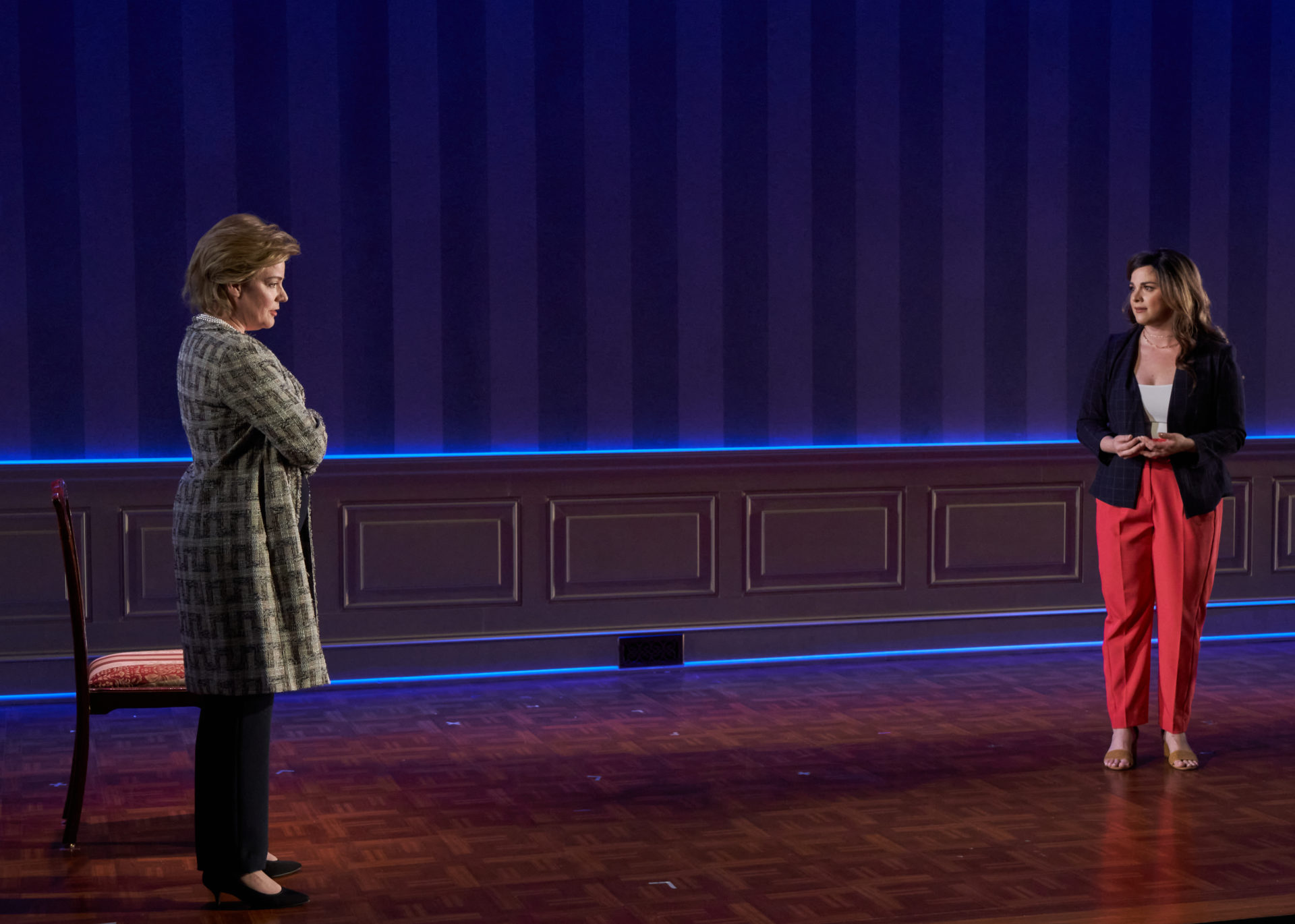Miami New Drama’s latest world premiere, When Monica Met Hillary, is a potent new drama from Winter Miller, who imagines how the infamous late 90’s political sex scandal with President Bill Clinton and 22-year-old intern Monica Lewinsky affected four women: Lewinsky, her mother Marcia, Hillary Clinton, and her longtime assistant Huma Abedin. (A Hillary protégé, Abedin married former Democratic Congressman Anthony Weiner, who became embroiled in sexting scandals that led then FBI director James Comey to reopen his investigation into Hillary’s emails days before the 2016 election – which many believe caused Hillary to lose.)
Though the scandal was decades ago, Miller’s play could not be more timely. The #MeToo movement has prompted a culture-shifting debate about men, women, sex, power, and how we allocate shame and responsibility. There’s been a re-evaluation of the Lewinsky-Clinton scandal, notably with Ryan Murphy’s American Crime Story: Impeachment. Huma Abedin has just released a memoir. Meanwhile the misogyny and hatred towards women, from virtual harassment to real life murders, only seems to have grown.
Miller, who is the same age as Lewinsky, has a unique background as both playwright and journalist. She was research assistant to Pulitzer Prize winning New York Times columnist Nicholas Kristof from 2004-08, as he exposed the horrors of the genocidal war in Darfur, Africa. The experience led Miller to write the acclaimed play In Darfur, which had a sold out run at the Public Theater in 2007 and has been produced across the U.S.
Miller’s plays frequently center on women, and include The Penetration Play, Spare Rib, Animalia Arthropoda, and No One Is Forgotten. She has written for the Times, New York Magazine, and The Boston Globe; and been profiled in The New Yorker, Bomb, WomenAndHollywood.com, and NPR. A founder of the Obie-winning collective 13 Playwrights, she has taught playwriting at Columbia University, The New School, and SUNY Purchase; and created theater with youth in Palestine and Uganda, and LGBTQ teens in NYC.
We talked with Miller about Monica, Hillary, why women clean up after men, #MeToo, journalism versus theater versus life, and more. This conversation has been condensed and edited.
What did you think of the Monica Lewinsky – Bill Clinton story at the time?
I was working as a news clerk at the New York Times. I wanted stories of substance on the front page, but they were getting bumped for stories about Clinton and Lewinsky. My feeling at the time was, let’s move on. I thought he was slimy for lying about it. But I was annoyed, because I wanted Bill Clinton to govern and make policy changes, like repeal Don’t Ask Don’t Tell for instance, but he had lost capital based on – what I saw at the time – his infidelity.
As far as Monica was concerned, I thought you’re an adult, you made that choice. What people do in the privacy of their own homes and the consensual decisions they make about their romantic and sexual lives is none of my business. But when it affects your ability to govern the nation that is infuriating. It was a stupid thing to concern the country about.
When did your attitude change?
It wasn’t until later, particularly when Monica came out with her TED talk in 2015, that I took another look and said ‘you know what? I wasn’t on the right side of this.’ Rather than looking at it as an abuse of power, I was looking at it as two people making consensual choices. My understanding of consent was based on notions that are outdated, that need to be revised. At the time, I resented the idea that women don’t have sexual agency in our choices, but I was not thinking of it as his taking advantage of her. Which it clearly was.
How did you come to write When Monica Met Hillary for Miami New Drama?
I had met [MiND Artistic Director] Michel [Hausmann] in Salt Lake City in 2017. I was workshopping a play, No One Is Forgotten, and he was workshopping Hilary Bettis’ Queen of Basel. We had conversations about politics and life and laughed a lot. A couple years later he called me up out of the blue and said “hey, I love that you write about politics, I want to commission you to write a political play.” He was interested in Clinton and Gingrich and the government shutdown. I said I’m not interested in those men, but I’m very interested in Monica Lewinsky and Hillary Clinton. And he said GREAT.
Why did you want to write about them?
I’m interested in the stories that aren’t told. Also, watching Hillary Clinton run for president and get rejected twice. I was curious how much was based on the blame she carried for everything her husband did. There are a lot of things she’s done, opinions and decisions she has made, that I disagree with, superpredators, invading Iraq, for instance. But you cannot argue that she was not the best prepared and smartest candidate in 2008 and in 2016, and I would have liked to have seen her win in 2016. I marvel at how resilient she is, how incredibly smart she is. It’s infuriating that we live in such a patriarchal country that we don’t get to celebrate her acumen.
In 2016, I was furious with both Anthony Weiner and James Comey about the emails. I know people are skeptical, but I believe that did have a major effect on the election and on Hillary in general. But the fact that Huma had to face a scandal so similar to what Hillary faced, and then Hillary had to face it again during her candidacy, seemed like the stuff of Greek tragedy. The curse of powerful entitled men who do whatever they want. And the women who love them. Or enable them.
Clearly Monica was a very smart woman who never got the chance to be anything other than America’s blowup doll. She was very bright, very funny. Before hearing her TED talk, I didn’t know what the price of shame had been for her. I didn’t know she had contemplated suicide. Upon reflection, I felt like I owed it to her to stand up for her. To present a much more nuanced look. She deserved for me and many other people to be on her side and we weren’t.
How much did the #MeToo movement inspire this play?
People are coming forward and talking about abuse; we are comforting our friends and loved ones for what they’ve gone through, and trying to figure out what we do about men we love who may or may not have harmed other people. How do we navigate the fallout from harm? The emotional burden of all of it seems to fall on the shoulders of women who deal with the costs of being violated and have to figure out how to continue to relate to the actual violator. Look in our communities at who pays the cost for what men do, at who’s left to clean up their messes. This story is about four women forced to clean up the messes of men in a very public manner. Men they will never get away from. Huma Abedin’s obit will mention Anthony Weiner. Monica Lewinsky’s obit will mention Bill Clinton. These women are forever entwined with men who repeatedly did really shitty things.
Another aspect that really appealed to me was the parallel of mothers and daughters. Hillary referred to Huma as being like her daughter. One thing I don’t think we realized until we heard Monica’s TED talk is how important her mother was for her. Her mother was there to make sure she didn’t harm herself.
Do you think things have changed for women? We’ve had #MeToo. But the sexism and abuse online seem to have gotten worse.
The misogyny has always been there. There are just more people more aware of it now. This kind of stuff has been going on in people’s homes and communities forever. We’re not an enlightened society. We pretend we are. But the way our society subjugates women is terrible. Look no further than government policies and television’s talking heads, it’s sickeningly obvious how much hatred is leveled at women, people of color, LGBTQI+ folks.
What do you hope people will take away from When Monica Met Hillary?
I hope that audiences re-examine what they think they know about these four people. I hope there’s a lot more empathy created for what women encounter everywhere–in the workplace and in the home. I hope people realize how much work women, trans and non-binary people do to keep men comfortable. And I hope people start to question where they are on that scale. What might we all do differently?
I have written the play from a position of respect for all four of these women, amazement at what they’ve endured, and a real curiosity about their resilience.
When Monica Met Hillary, a world premiere play by Winter Miller, Directed by Margot Bordelon
On stage at the Colony Theatre through March 27th


